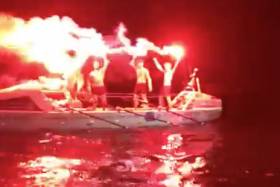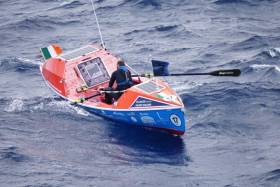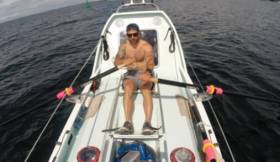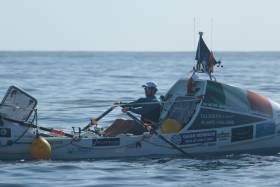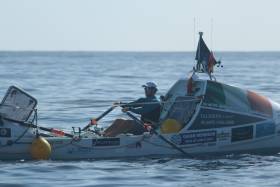Displaying items by tag: Atlantic Row
Relentless Rowers Set New Record
#Rowing: A crew from Cork and Dublin, Relentless, have set a new record for rowing the Atlantic for a Republic of Ireland team. Sean Underwood, Pat O’Connor and Eoin O’Farrell and Thomas Browne crossed the finish line in Antigua this morning after taking just 32 days, 22 hours and four minutes to row from La Gomera in the Canary Islands. They finished sixth in the Atlantic Challenge race, just over three days behind winners The Four Oarsmen, who became the fastest crew ever to row the Atlantic. Ireland had two good placings in the race: on Sunday, Northern Irish crew Home to Portrush finished one place ahead of Relentless in a time of 31 days eight hours and 57 minutes.
Battling Browne Back on Track in Atlantic Row
#Rowing: Damian Browne is back on track in the Atlantic Challenge rowing race. The solo oarsman covered 36 nautical miles (67 km) in the 24 hours to midday on Saturday and heads into the third week of the race from the Canaries to Antigua with a good chance of bettering his 20th place by overtaking some of the pairs. Browne, who competes as Gullivers Travels, was hurt during a set of capsizes just after Christmas but vowed to race on.
Near the head of the 21 boats which are still in the race, Relentless, from Cork and Dublin, and Home to Portrush have swapped places. Both are fours. The Northern Ireland crew covered a remarkable 74 nautical miles (137 km) in the day to midday Saturday and took over in fifth from Relentless, which has taken a more southerly route. The leading crew is the Four Oarsmen, with Team Antigua third. Solo oarsman Mark Slats in Row for Cancer holds on to third. Swiss Mocean, which is also taking a southerly course, lies fourth.
Battling Hennigan Covers 150 Kilometres in One Day
#Rowing: Gavan Hennigan is producing extraordinary mileage in his battle to be the next boat to finish the Talisker Whisky Atlantic Challenge. The solo oarsman has held third since early in the 12-boat race from the Canary Islands to Antigua in the West Indies. The two leading craft, Latitude 35 and Row for James have finished and in the battle to be next boat to finish Hennigan has come under serious pressure from the three-man crew of American Oarsmen, which closed on him and looked set to pass him. In recent days, with a switch to more favourable winds, Hennigan has stretched his slight lead. He has been covering over 70 nautical miles (130 kilometres) per day. On Monday he covered 81 nm (150 km) to 78nm (144 km) for American Oarsmen.
Solo Rower Hennigan Holds Off Three-Man Crew
#Rowing: Solo oarsman Gavan Hennigan and the three-man American Oarsmen are locked in a stirring battle for the lead in the Talisker Whisky Atlantic Challenge. With two four-men crews already finished, the Irishman, who took over in third early on, holds the top spot on the water in the 12-boat race. Crew boats made more progress in the past week as Hennigan encountered tricky conditions. American Oarsmen, who can row over the full day while Hennigan must take some rest, had looked set to reel him in on Thursday. However, Hennigan has upped his mileage to an impressive 62 nautical miles (115 kilometres) per day, exactly matching American Oarsmen. With about a week’s rowing left to the finish in Antigua, Hennigan’s lead is 12 nautical miles (22 km).
“I’m focused on controlling the controllables,” Hennigan said. “I know about American Oarsmen, but I can’t do anything about what they’re doing. I can only focus on rowing my boat and pushing myself to the limit to get to Antigua as fast as I possibly can.”
Hennigan Half Way to His Atlantic Goal
#Rowing: Irish oarsman Gavan Hennigan has crossed halfway on his row across the Atlantic Ocean. The Galway man has had a tough 36 hours, with northerly winds pushing him off his preferred course, but the winds are switching to a more easterly direction and he has already begun to up his rate of nautical miles per day. Hennigan has been holding third place in a race with 12 boats, just four of them solo craft. He reached the halfway mark going into the 25th day of the Talisker Whisky Atlantic Challenge, which runs from La Gomera in the Canary Islands to Antigua.


























